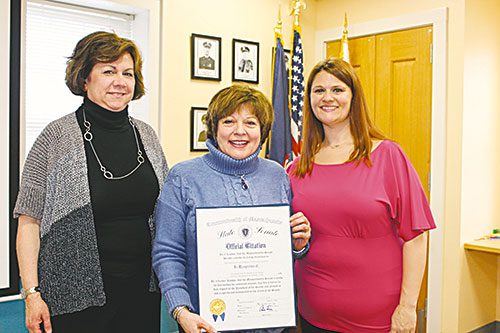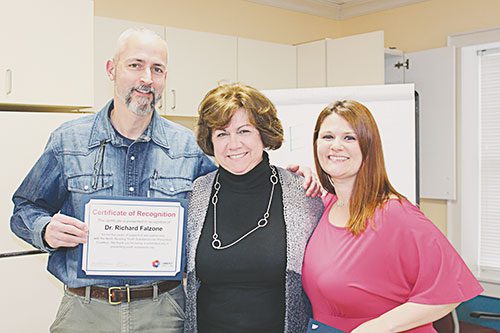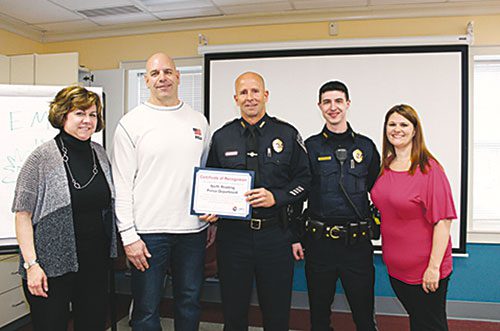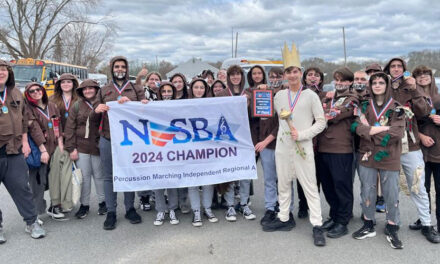Published April 25, 2019
By MAUREEN DOHERTY
NORTH READING — A milestone in the battle against substance abuse and addiction was recently recognized with the fifth anniversary celebration of the North Reading Youth Substance Use Prevention Coalition.
While the name is admittedly a tongue-twister, its chairman, Marci Bailey, told those gathered for the celebration held at the North Reading Police Station that this coalition tackles “some of the biggest challenges” faced by the community. These challenges stretch well beyond the town’s borders on a statewide and national level, she said.
“It would be untruthful for me say I have my arms around it. It’s a daunting task but one that is so important to work on,” Bailey said. “Each and every day we chip away at it. We get one kid going in the right direction, we help one family understand how to talk to their children about substance use. We help teachers feel more comfortable in recognizing who needs help, talking to kids, putting their arm around them, being aware of what is going on at school.”

THE NORTH READING Youth Substance Use Prevention Coalition was recognized for its five years of demonstrated commitment in preventing substance use among local teens by the State Senate at the request of Sen. Bruce Tarr. From left: coalition Chair Marci Bailey, MaryAnn Nay representing Sen. Tarr’s office, and Drug-Free Communities Grant Coordinator Amy Luckiewicz. (Maureen Doherty Photo)
If they can continue to do these things through the wide range of programming and outreach they have brought to the community, Bailey believes “we’ve done our job,” adding, “We look at policy, we look at theory, we look at reality, and we’ll keep doing that.”
About 18 months ago, Bailey asked Amy Luckiewicz, who currently serves as the town’s Drug-Free Communities Grant Director, if she could help her efforts in any way. Amy’s enthusiastic response was “have I got a job for you!”
Bailey described Luckiewicz and her counterpart, School Resource Officer and Detective Paul Lucci, and the many others in town involved in this cause as the Coalition’s “boots on the ground.”

DR. RICHARD FALZONE accepts a certificate of recognition from the North Reading Youth Substance Use Prevention Coalition for his five years of partnering with and supporting the coalition’s goals from Chair Marci Bailey and Drug-Free Grant Coordinator Amy Luckiewicz. (Maureen Doherty Photo)
About six years ago when Luckiewicz was the Youth Services Director, she recalled Police Chief Michael Murphy had “challenged us to come up with a coalition model.” Fortunately, she found mentors with experience in this field in nearby communities to collaborate with and “lean on.” Through her affiliation with Wakefield Rotary, for example, she was mentored by Wakefield’s Substance Abuse Prevention Coordinator Catherine Dhingra. She also met Peg Sallade, who is now Lynnfield’s Substance Abuse Coordinator.
Pointing to 10 large posters lining the walls of the Hank Purnell community room that highlighted the coalition’s many accomplishments in the ensuing years, Luckiewicz explained that to date over 25 community presentations and guest speakers have been brought to town through the Coalition to educate the community. The list includes: Learn 2 Cope, Jon Mattleman, Screenagers, Angst, Jon Morello, Dr. Richard Falzone, Middlesex D.A. Marian Ryan, Travis Roy, Dr. Mike Folwin, Chris Herren, Vaping 101, Dr. Ruth Potee, Samaritans, Minding Your Mind, Parent University, If They Had Known, In Plain Sight, and others.
Also during this timeframe, their coalition has grown from nine members to 39 members and they have held over 100 hours of meetings, planning sessions and subcommittee meetings on a wide range of topics. But they are always open to have more people join them their efforts and she encourages those interested to submit an application.

CHALLENGE ACCEPTED. The continual support by the North Reading Police Department of the initiatives developed by the North Reading Youth Substance Use Prevention Coalition to combat substance abuse over the past five years was recognized by the Coalition at its fifth anniversary party. From left: Chair Marci Bailey, Detective Tom Hatch, Chief Michael Murphy, Detective/SRO Paul Lucci and Drug-Free Communities Grant Director Amy Luckiewicz. (Maureen Doherty Photo)
716 pounds of drugs
Another key accomplishment has been getting unused prescription medications out of homes in an effort to cut down on the accessibility of all types of drugs found in the home to keep youths safer and also keep the drugs from entering the water supply. Once upon a time people were told to flush unneeded medications. Doing so is no longer advisable given the trace drugs found in the water supply. The prescription drug drop off box is accessible to everyone in the lobby of the North Reading Police Department 24/7.
The message is getting through to residents because this one program succeeded in getting 716 pounds of unneeded drugs out of local homes in 2018, which was a 60 percent increase over the amount the town collected in 2017, Amy said.
The coalition has also partnered with the town’s schools to bring educational materials and guest speakers to the students. Det. Lucci and Luckiewicz regularly make presentations to local students on topics ranging from vaping, marijuana and emerging trends, and the town’s new Mental Health Counselor Laura Miranda recently joined the effort, adding a new dimension concerning mental health issues and treatment referrals.
They have also increased their advocacy efforts during the past five years with politicians and state entities, including State Rep. Brad Jones, State Sen. Bruce Tarr, Senators Elizabeth Warren and Ed Markey and Congressman Seth Moulton as well as the state Attorney General’s office, Middlesex D.A. Marian Ryan, the Cannabis Control Commission, and the state Department of Public Health.
One of Luckiewicz’s posters explained how the coalition continues to collaborate across a minimum of 12 sectors within the community to obtain as many perspectives as possible. In this example they strategized on ways to encourage youths to “participate in alternative forms of consequences when identified as using substances” with the goal of encouraging these youths to participate in educational and diversion programs.
“The biggest achievement we had was graduating from the National Coalition Academy by CADCA — Community Anti-Drug Coalition of America,” Luckiewicz said of herself and SRO Lucci. In this academy, they learned how to keep their work strategic and focused to develop programs that are both sustainable and effective through the use of logic models, communications plans, sustainability plans, 12-month action plans, community needs assessments, data reviews, coalition self-assessments, budget narratives and evaluation plans.
“One question I am asked the most about is how do we know what to do? Although we follow the seven strategies of community change we do everything based on science,” Luckiewicz said.
As an example, using a logic model when attempting to tackle a single problem, such as underage drinking by teens, enables them to “understand the root causes of using specific substances,” for example, “casual attitudes among adults was identified as a root cause for youth alcohol use.”
“It’s not without a lot of effort that we decide on the strategies that we go through,” she said.
She added only three years of events were funded by the federal grant; the initial two years were funded entirely by donations through the Community Impact Team (CIT), Luckiewicz said, which gave them their start.
“We are never bored and we are always welcome to other community members dropping in to the monthly meetings or simply work on policy. There are other opportunities to help, such as setting up for events,” she added.
Future programs
“Our Alcohol Use Prevention subcommittee is developing nine different strategies and approaches to discourage underage alcohol use,” commented coalition member Christie Perrone, such as alcohol compliance checks at liquor stores, and providing information about social host bylaws to parents and families.
Perrone added that they will be “launching our summer programs designed to promote healthy behaviors within the community for the children and provide healthy outlets for them, and encourage social skills and teach those refusal skills.”
“We’re excited about our parent-based science program that will be led by other parents in the community to spread the word on how parents can help their children make good choices and they can make good parenting choices to influence their children positively,” Perrone added.
“Our Community Impact Team will be kicking off our Youth Action Team to be guided by two professional health educators,” Perrone said, with a goal of getting kids “more involved in helping to influence health behaviors among their peers.”
Luckiewicz said the Coalition wanted to recognize volunteers and community partners “who have been with them since day one” with certificates of recognition as part of their fifth anniversary celebration.
The community partners recognized included the North Reading Police Department, which Luckiewicz said was “the organization that started it all…It was Chief Murphy’s idea to get this going.” In addition to the chief, police Detective Tom Hatch and Detective Paul Lucci were recognized. The role of the Fire Department, represented by Chief Don Stats, was also singled out.
Luckiewicz also acknowledged “three members who have been with us since day one, Dr. Richard Falzone, eighth-grade health teacher Gayle DeMore and parent Sandy Garniss.” Also recognized were North Reading Youth Services, represented by Director Jen Ford; Director of Elder Affairs Mary Prenney; the Select Board, represented by Andy Schultz, North Reading Board of Health Director Bob Bracey and Board of Health member/public health nurse Pam Vath; Parks & Recreation, represented by Rita Mullin; Library Director Sharon Kelleher; the Social Services Action Team and K-12 Action Team and media partners NORCAM and the Transcript.
MaryAnn Nay of State Senator Bruce Tarr’s office brought an official citation from the Massachusetts State Senate recognizing the group’s efforts.
“What you do is just incredible. It is wonderful to be here on behalf of Sen. Tarr. I know he is such a supporter of this group and this community,” she said, adding that it takes a community effort “to truly put your arms around these youths and to show them the right way, and to guide them through life.”




